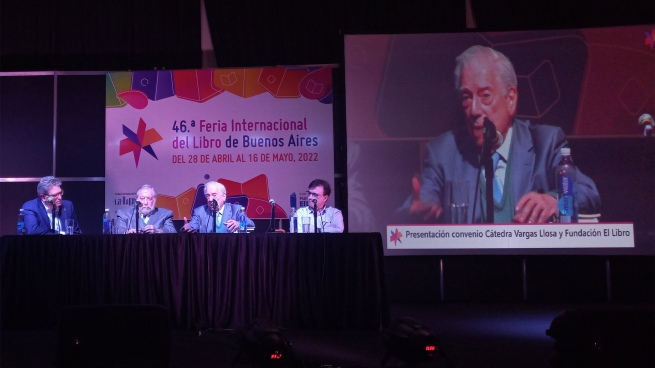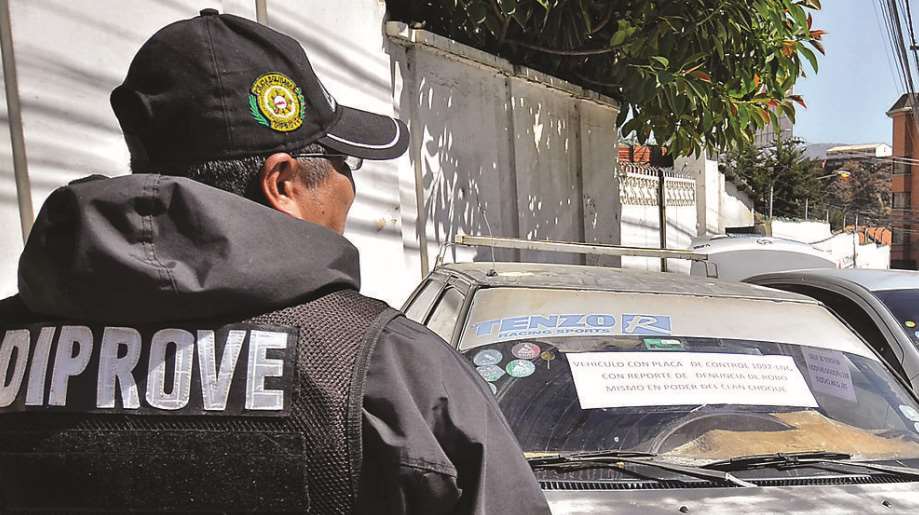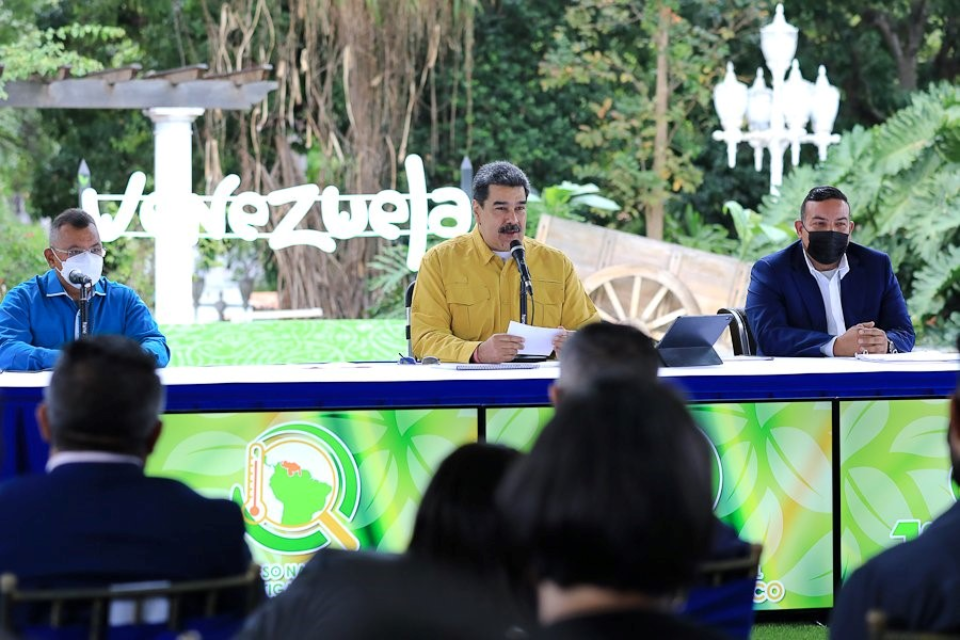During the presentation of the agreement between the Vargas Llosa Chair and the El Libr Foundationor for hold a literary contest that will reward the best book of short stories in Spanish, Nobel laureate Mario Vargas Llosa made his first speech at the Book Fair and In front of a crowded but silent auditorium, he spoke with the Spanish writer Javier Cercas about the ductility of Spanish to unite in diversity, debated what the role of governments should be in promoting the language and celebrated the figure of Jorge Luis Borges as the great “liberator” of our language.
“The diversity of nuances of Spanish enriches our literature and I think that is why it is one of the richest and most diverse. I read Cercas and feel a lot of emotion and he can read me and feel the same. It is one of the great advantages that Spanish has over other languages: unity in diversity”, celebrated the referent of the Latin American boom and author of novels such as “Conversation in the Cathedral”, “La tía Julia y el escribidor” and “La city of dogs.
After being hospitalized for coronavirus at the age of 86, Vargas Llosa returned to the Book Fair, which had visited in 2019 in the last face-to-face edition before the pandemic and, in the framework of the crowded José Hernández Hall, he lent himself to a dialogue with Cercas who, although at times flirted with politics and government decisions, remained for an hour in the field of literature.
Although the tone of the talk was informal, Vargas Llosa and Cercas demonstrated with their speeches that they had read each other and shared with the audience some of the literary issues that they have been discussing for years, when started a friendly dispute around the Spanish writer Benito Pérez Galdós, which also inspired “The Still Gaze”, the literary essay that the Nobel Prize winner is presenting this year at the Fair.
“I am so glad that this festival of books has been resurrected after the pandemic” Vargas Llosa began at the beginning of his speech and, after celebrating the benefits of the language to unite such diverse cultures, he aimed to account for this reality from his professional experience as a writer: “I was born in Peru and I write from there, but I have lived in many countries and my literature has been diversifying as I have had more linguistic experience. I think that is more common in the writers of our time, they write in a common and diverse Spanish and jump from their own language to the foreign language”.
Later, he took the initiative and Cercas was asked how he felt writing in Spanish. “I am not a Spanish writer, but I am a writer in Spanish. As a teenager I stopped reading the books of the Marists who educated me, I went to the bookstore and I found your books, those of Borges, those of García Márquez and Rulfo. They were totally decisive, they were within my reach and they were also changing the course of Western literature”, Cercas contributed in a biographical key. Later, he outlined a hypothesis: the Boom took the Spanish language out of the eclipse. “We Spaniards do not understand Cervantes, the French and the English understand him later, we Spaniards miss the modern novel. And that is why Don Quixote looks like an English book. But I was lucky that I became a serious reader and aspiring writer when that Boom revolution was happening in the Spanish language and not in any specific country. I am the son of that ”, he defined himself.
Comfortable with the dynamics, the author of “Anatomy of an instant”, “Soldiers of Salamina” and “The Shadow Monarch” returned another question to the Nobel: “Are the public authorities aware of the immensity of our language? Do you understand that this is our main wealth? “Fortunately for the wealth of the Spanish, no,” answered the Peruvian. Governments are not aware of the wealth they have in their hands. And I think this is better, because if they were to actively use Spanish they would probably mess it up. The freedom that we have enjoyed in writing without being pestered by governments with guidelines or directions was a great wealth”, he maintained. Later, he returned to resort to personal anecdotes to explain the literary. “As a child, I already had a literary vocation but the world of Peru was very small. I had the illusion of being a French language writer, I learned French and when I arrived in Paris at the age of 17 I discovered that everything Latin American was very up to date in France. So, it is somewhat ridiculous, but it was in France that I discovered that he was a Latin American. I started reading Argentines, Chileans and Mexicans and discovered a rich and cutting-edge world. So I began to feel Latin American and Peruvian. It was a great advantage that the governments did not worry about Spanish, ”he said.
Cercas, not entirely satisfied with his partner’s response, insisted: “I was referring to the promotion of the language, not a normative role. The circulation of works in Spanish today is a problem. Imagine a Cervantes Institute for the entire Spanish language! The power that would have to promote our literature. The national closure continues to exist, we live atomized and that is a tragedy, it should not be like that”.
“But I understand, maybe we have to leave our house to know who we are. Borges discovers himself Argentine in Geneva and in Mallorca”, he later conceded and accepted that he also recognized himself as a Spanish writer during his stay in the United States.
Vargas Llosa –who as a young man was a communist; as an adult, liberal and in 1990 he was a candidate for the presidency of Peru for the right-wing Democratic Front- he stuck to his stance of preserving separate spheres for literary creation and politics: “I am afraid that governments intervene in literature. Literature and governments operate in different and contradictory fields. I think I would prefer that this freedom that we enjoy be preserved today as well.” Cercas, at that time, signed the armistice, although with buts: “I understand your reticence. It’s fair. In an authoritarian system that would be impossible. But in a democratic society we would have to manage to limit the damage”.
Consolidated in his role as an inquirer and with the authentic literary curiosity of someone who recognizes himself as the “son” of the Boom, the Spaniard asked the Nobehe why he had stopped writing stories after his first book “The Bosses” And if you didn’t believe that one of the characteristics of the Spanish language is to praise the short story. “In your book on Borges you say that with Borges literature becomes intelligent. I think you meant that suddenly a language that tends towards the baroque becomes economical, exact and intelligent. That is a revolution. I think that the Boom is unimaginable without the change that Borges is bringing about”, proposed Cercas.
“Borges freed the language and made possible all the transfers that we later enjoyed. He left us an extraordinary freedom”, Vargas Llosa reflected. and pointed out that from his Chair he seeks to operate a similar generational change: “Perhaps `Catedra´ is a very academic word. I want to make life easier for the young writer who has a very difficult time in our countries. From the Chair, with prizes, contests and incentives, we want to facilitate that vocation”.
About the closing, Cercas asked him again why he had not written a book of stories after “The bosses” and why he had recently decided to add certain fantastic elements to the short stories. In the story, does he dare to stop being a realist writer? Vargas Llosa chose to answer him and said goodbye to the Fair with a literary argument: “Realistic literature does not submit to the rules of the game of reality and often even clashes with it.”


















